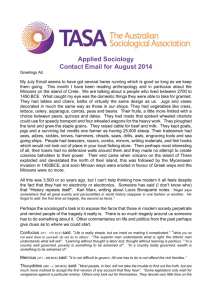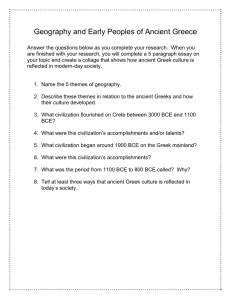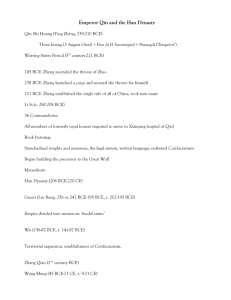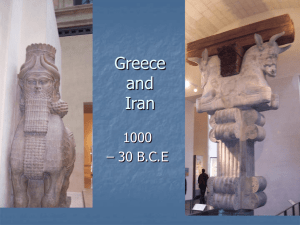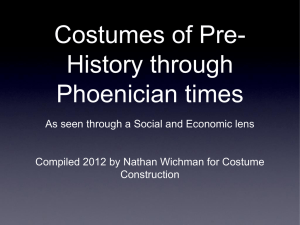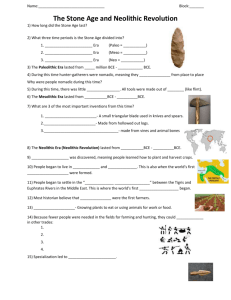lecture notes
advertisement
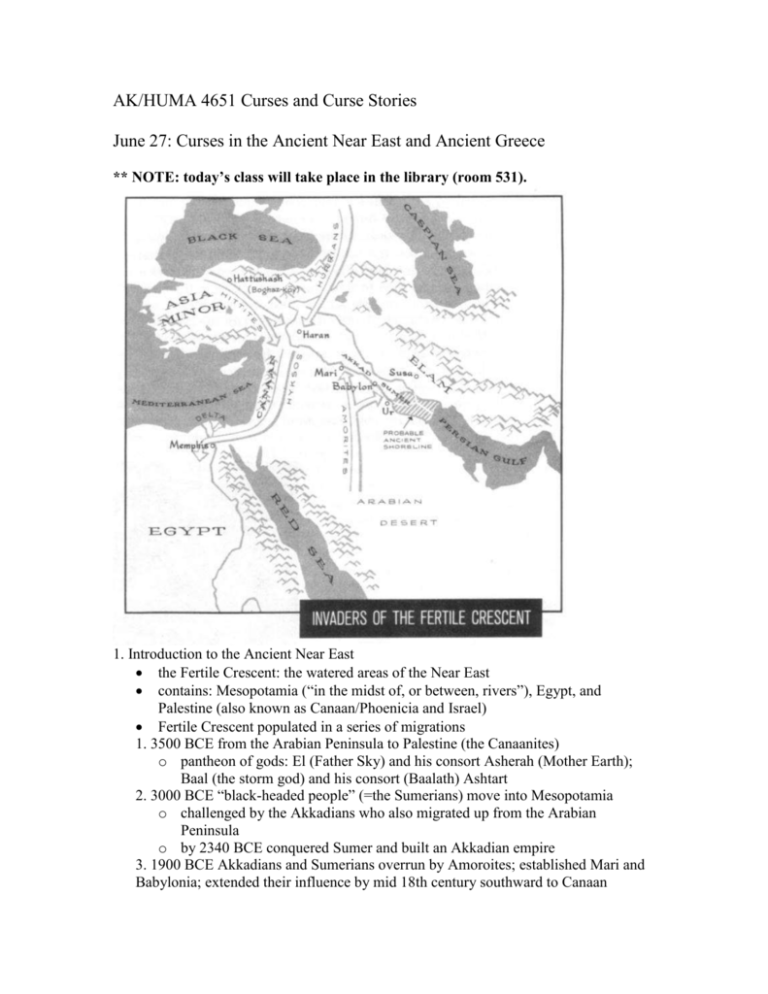
AK/HUMA 4651 Curses and Curse Stories June 27: Curses in the Ancient Near East and Ancient Greece ** NOTE: today’s class will take place in the library (room 531). 1. Introduction to the Ancient Near East the Fertile Crescent: the watered areas of the Near East contains: Mesopotamia (“in the midst of, or between, rivers”), Egypt, and Palestine (also known as Canaan/Phoenicia and Israel) Fertile Crescent populated in a series of migrations 1. 3500 BCE from the Arabian Peninsula to Palestine (the Canaanites) o pantheon of gods: El (Father Sky) and his consort Asherah (Mother Earth); Baal (the storm god) and his consort (Baalath) Ashtart 2. 3000 BCE “black-headed people” (=the Sumerians) move into Mesopotamia o challenged by the Akkadians who also migrated up from the Arabian Peninsula o by 2340 BCE conquered Sumer and built an Akkadian empire 3. 1900 BCE Akkadians and Sumerians overrun by Amoroites; established Mari and Babylonia; extended their influence by mid 18th century southward to Canaan other peoples coming into the Fertile Crescent: Hurrians and Hittites some in turn moved into Egypt; Egyptians called them the Hyksos (“rulers of foreign countries”); occupy Egypt from 1720-1570 BCE by 13th century BCE dominant group in Palestine are the Hebrews; name means “wanderers” or “outsiders”, similar to “barbarians” or “pagans”; seminomadic people who lived on the fringes of society; scattered throughout Asia Minor, Mesopotamia, Syria, Canaan, and Egypt two major migrations of Hebrews: with the Amorites in the eighteenth century and from Egypt in the thirteenth century 2. Mesopotamia Epic of Gilgamesh (ca. 3000-2000 BCE) contains the Great Flood (with Utnapishtim playing “Noah”) in ch. 7, Enkidu curses Shamash the prostitute and a trapper who civilized him Just as dawn began to glow, Enkidu raised his head and cried out to Shamash, at the (first) gleam of the sun his tears poured forth. “I appeal to you, O Shamash, on behalf of my precious life (?), because of that notorious trapper who did not let me attain the same as my friend May the trapper not get enough to feed himself . May his profit be slashed, and his wages decrease, may... be his share before you, may he not enter ... but go out of it like vapor(?)!” After he had cursed the trapper to his satisfaction, his heart prompted him to curse the Harlot. “Come now, Harlot, I am going to decree your fate, a fate that will never come to an end for eternity! I will curse you with a Great Curse, may my curses overwhelm you suddenly, in an instant! May you not be able to make a household, and not be able to love a child of your own (?)! May you not dwell in the ... of girls, may dregs of beer (?) stain your beautiful lap, may a drunk soil your festal robe with vomit(?), ... the beautiful (?) ... of the potter. May you never acquire anything of bright alabaster, may the judge. .. may shining silver(?), man’s delight, not be cast into your house, may a gateway be where you rake your pleasure, may a crossroad be your home may a wasteland be your sleeping place, may the shadow of the city wall be your place to stand, may the thorns and briars skin your feet, may both the drunk and the dry slap you on the cheek, ... in your city's streets (?), may owls nest in the cracks of your walls! may no parties take place... ... present(?). and your filthy ‘lap’ ... may.., be his(?) Because of me... while I, blameless, you have... against me.” Enkidu is scolded by Shamhat; he then retracts his curse: Enkidu spoke to the harlot, saying: “Come, Shamhat, I will decree your fate for you. Let my mouth which has cursed you, now turn to bless you! May governors and nobles love you, May he who is one league away bite his lip (in anticipation of you), may he who is two leagues away shake our his locks (in preparation)! May the soldier not refuse you, but undo his buckle for you, may he give you rock crystal(!), lapis lazuli, and gold, may his gift to you be earrings of filigree(?). May... his supplies be heaped up. May he bring you into the ... of the gods. May the wife, the mother of seven (children), be abandoned because of you!” Code of Hammurabi; Babylonian king 1792-1750 BCE Babylonian and Akkadian medical texts describe cures aimed to counteract curses, and the belief that epidemics are said to be perpetrated by gods and cease because the god “calmed down” Mesopotamian Maqlu tablets contain counter-witchcraft directives and incantations the Hittite Military Oath: “…and may they dress them in a womanly fashion…and let them place in their hands a distaff and a spindle…And let them be so cursed that their land not bear fruit, that their wives not bear children like unto their begetters, but monsters, that their cattle not increase according to nature, that they suffer defeat in battle and in lawsuits and in marketplace, and that they perish utterly.” kudurru: Akkadian word for “frontier” or “boundary” 3. Egypt tomb curse formula typically contained two elements: A description of an act displeasing to the author of the curse, and the consequences to one performing this act (often in both this lifetime and beyond) through some agency (god, king, private person, animal, etc.) Listen all of you! The priest of Hathor will beat twice any of you who enters this tomb or does harm to it. The gods will confront him because I am honored by his Lord. The gods will not allow anything to happen to me. Anyone who does anything bad to my tomb, then the crocodile, hippopotamus, and lion will eat him (from the Dynasty 3 tomb of Petety at Giza) As for anyone who shall lay a finger on this pyramid and this temple which belong to me and my ka, he will have laid his finger on the Mansion of Horus in the firmament, he will have offended the Lady of the Mansion ... his affair will be judged by the Ennead and he will be nowhere and his house will be nowhere; he will be one proscribed, one who eats himself. (Utterance 534, §1278-9, from the Dynasty 5 Pyramid) a stele belonging to Sarenput I, a nomarch of Elephantine under Senusret I (Dynasty 12), is meant to protect the offerings left to the statue in his image: As for every mayor, every wab-priest, every scribe and every nobleman who shall take [the offering] from the statue, his arm shall be cut off like that of this bull, his neck shall be twisted off like that of a bird, his office shall not exist, the position of his son shall not exist, his house shall not exist in Nubia, his tomb shall not exist in the necropolis, his god shall not accept his white bread, his flesh shall belong to the fire, his children shall belong to the fire, his corpse shall not be to the ground, I shall be against him as a crocodile on the water, as a serpent on earth, and as an enemy in the necropolis. also have Egyptian pots and figurines 19th and 18th c. BCE inscribed with names of hated foreigners which were smashed in order to break the power of their enemies 4. Discussion of Treaties 5. Greece ca. 1500 warrior people from north move into south of Greek peninsula ca. 1400-1200 BCE Mycenaean period; influenced by Minoans of Crete ca. 1250-1150 BCE decline of Mycenaeans ca. 1100-800 BCE Dark Age ca. 800-500 BCE Archaic Period; flourishing of Greek culture and civilization Homer’s Iliad and Odyssey: one’s fate is tied to the whim so the gods; a person or an army can fall in battle or face misfortune due to the gods’ wishes (e.g., Odysseus’ men transformed into pigs by Circe; 10.320); the Erinyes (Ερινύες), female personifications of vengeance(see Iliad 9.453-457; 3.278; 19.260; Odyssey 17.465) Medea: the often-maligned figure associated with witchcraft: I’ll now go to the land of Erechtheus, to live with Aegeus, son of Pandion. As for you, you'll have a miserable death, as is fitting for a coward. Now you’ve seen the bitter ending of your marriage to me, your head will be smashed in, when you’re hit by a moldy relic of your ship the Argo. (Euripides, Medea 160 seq.) for other references to Medea and cursing see Argonautica 4.1635-90 in which she uses the evil eye; and a scene in Seneca’s Medea (6-23) in which she invokes various deities in order to curse her enemies Sophocles, Oedipus Rex 269-72: And I pray whoever the man is who did this crime, one unknown person acting on his own or with companions, the worst of agonies will wear out his wretched life. I pray, too, that, if he should become a honoured guest in my own home and with my knowledge, I may suffer all those things I’ve just called down upon the killers. And I urge you now to make sure all these orders take effect, for my sake, for the sake of the god, and for our barren, godless, ruined land. For in this matter, even if a god were not prompting us, it would not be right for you to simply leave things as they are, and not to purify the murder of a man who was so noble and who was your king. .


